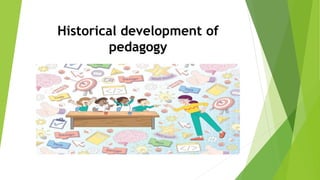
Historical development of pedagogy
- 2. Throughout history, educators and philosophers have discussed different pedagogical approaches to education, and numerous theories and techniques have been proposed In the Western world, pedagogy is associated with the Greek tradition of philosophical dialogue, particularly the Socratic method of inquiry. Socrates employed the Socratic method while engaging with a student or peer. The instructor in this learning environment recognizes the learners' need to think for themselves to facilitate their ability to think about problems and issues. Plato describes three castes: one to learn a trade; one to learn literary and aesthetic ideas; and one to be trained in literary, aesthetic, scientific, and philosophical ideas. Plato saw education as a fulfillment of the soul.
- 3. Since the time they launched their first school in 1548, the Jesuits believed that a high quality education is the best path to meaningful lives of leadership and service. The Jesuits adapted available educational models while developing their own pedagogical methods to become the "schoolmasters of Europe.“ During the mid-1600s in what is now the Czech Republic, the educator Comenius wrote the first children's textbook containing vivid illustrations, entitled The Visible World in Pictures. Known as the "Father of Modern Education," Comenius believed in a holistic approach to education. He taught that education began in the earliest days of childhood and continued throughout life, and that learning, spiritual, and emotional growth were all woven together.
- 4. During the 1700s, the philosopher Jean-Jacques Rousseau presented his methodology on the education of children in his novel Emile, the story of the education of a young boy. Within his novel, Rousseau described the importance of having a focus on both environment and personal experience. Different learning stages are described: for example, during the "the age of nature" (from ages 2 to 12), Rousseau argued that a boy should receive no moral instruction or verbal learning, as the mind should be "left undisturbed until its faculties have developed." Instead, education during this stage should be focused on physical and sensory development. In the late eighteenth and early nineteenth centuries, Johann Heinrich Pestalozzi, a Swiss pedagogue and educational reformer, greatly influenced the development of the educational system in Europe and America. His educational method emphasized the importance of providing a loving, family-type environment in which the child can grow and flourish naturally, balancing their intellectual, physical, and technical abilities, with emotional, moral, ethical, and religious growth.
- 5. Friedrich Wilhelm August Fröbel, a German educator, also made substantial advances in children's education, particularly the invention of the kindergarten system for young children. His own difficulties as a child, his love of nature, and his faith in God, combined with his experiences with Pestalozzi's educational system, were the foundation for his insights into the education of very young children. He recognized the importance of play in order to allow their creativity to unfold and blossom. His school included a large room for play, as well as a garden outside for the children to grow flowers and other plants. John Dewey believed that meaningful learning is participatory, and he emphasized relevance over authoritarianism. His theory was also linear in that the past and the present shapes the future.
- 6. Maria Montessori’s theories werethat children essentially teach themselves; the teacher’s primary responsibility is to create the appropriate environment for learning and provide the spark that allows children to develop naturally. Given the ability to be mobile and learn from their surroundings rather than being forced to sit still and be lectured to, most children, even rough inner- city kids, flourished under her system. Paulo Freire created an approach to emancipatory education and a lens through which to understand systems of oppression in order to transform them. He flipped mainstream pedagogy on its head by insisting that true knowledge and expertise already exist within people. They need no “deposits” of information (what Freire calls “banking education”), nor do they need leftist propaganda to convince them of their problems. What is required to transform the world is dialogue, critical questioning, love for humanity, and praxis, the synthesis of critical reflection and action.